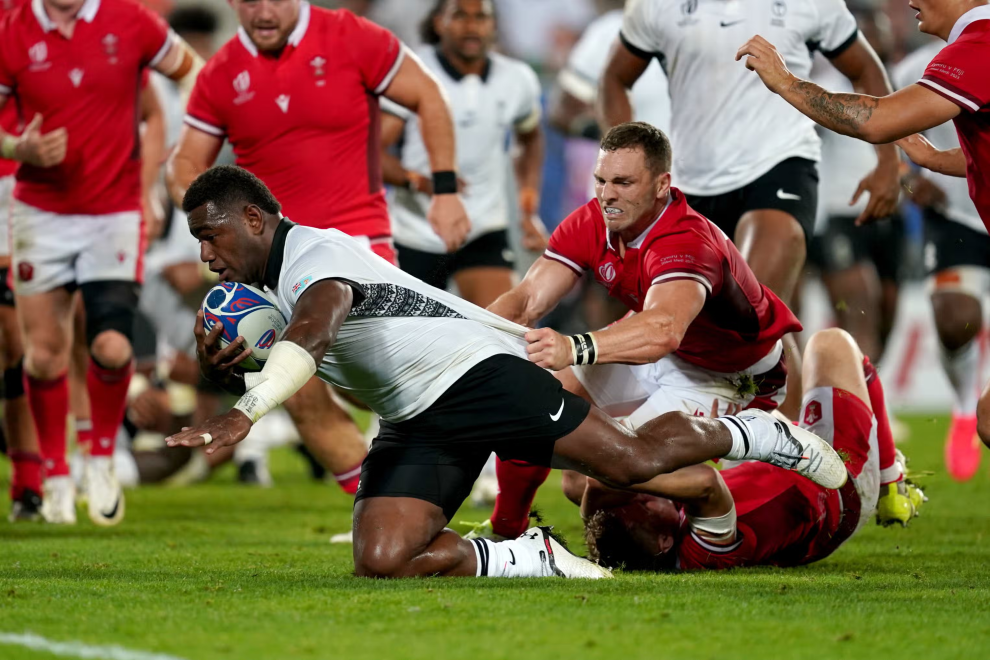What a thrilling contest it was. In a match that saw Fiji exhibit an unmatched level of fitness, Wales were pushed to their limits, and the game hung in the balance until the very last seconds. Semi Radradra, with the try line beckoning and the clock deep in the red, couldn’t hold onto a bouncing ball, narrowly missing out on a comeback for the ages. Fiji, once trailing by 18 points with only 14 minutes remaining, came within inches of an incredible turnaround. The anticipation was palpable, and the popularity of such a scenario would have been off the charts.
Ultimately, it was Wales’ experience and rugby nous, typically associated with a higher status in the rugby world than Fiji, that saw them through. While Wales had faced their own challenges lately, finding themselves three places below Fiji in the world rankings, they managed to secure victory with four crucial tries. Following England’s strong response to their critics, this bonus-point win served as a significant boost for British rugby.
Warren Gatland, Wales’ head coach, expressed his delight with the outcome, acknowledging that most people had expected Fiji to emerge victorious. Gatland praised Fiji’s quality but commended his team for their courage and resilience.
In today’s rugby landscape, the significance of world rankings is often questioned. The previous night, we witnessed the eighth-ranked team convincingly defeat the sixth-ranked team, even while playing with only 14 players for most of the match. In this matchup, Fiji, ranked seventh, held sway over several “Tier 1” teams, including their opponents, Wales, ranked 10th.
Both sides displayed solid set-piece skills and physicality, making it challenging to distinguish between them in these aspects. However, it was in the midfield where their differences became apparent. Wales took an early lead when George North capitalized on a penalty by Dan Biggar and slick handling from Biggar and Liam Williams to send Jack Adams over for the game’s opening try.
Fiji, though, remained composed and struck back swiftly. Waisea Nayacalevu capitalized on a loose ball in midfield and glided effortlessly to the try line. Just minutes later, Fiji struck again, following a similar pattern but with more finesse. Nayacalevu initiated a half-break to release Radradra, who, instead of bulldozing through the final defender, opted to provide the scoring pass to Lekima Tagitagivalu, who strolled over the line.
While Wales wasn’t dominating proceedings, they efficiently gathered points. Another penalty from Biggar was followed by North’s second try, set up again by the impressive midfield combination of North and Nick Tompkins, giving Wales an 18-14 lead at halftime.
The challenge for Fiji grew even steeper within 10 minutes of the second half. It was that midfield area again, with Tompkins breaking through from a scrum on halfway, igniting a frantic exchange of passes between Adams and Williams on the left wing. The ball was eventually moved to the right, allowing Louis Rees-Zammit to collect and sprint to the corner. Even the Fijians found it challenging to match his speed. Biggar successfully converted from the touchline.
Fiji needed a response, and they fought valiantly. Several penalties provided them with opportunities to launch extended attacks on Wales’ line around the hour mark. Wales conceded penalties on five occasions during this period, and only after the fifth did the referee issue a warning. Fiji relentlessly sent powerful ball-carriers towards the try line, but Wales managed to withstand the onslaught, sometimes resorting to questionable tactics. Eventually, Fiji knocked the ball on over the try line, squandering a golden opportunity.
The frustration reached its peak when the referee, despite multiple penalties by Wales on their own try line, did not produce a card. Instead, Fiji received a yellow card for their very next infraction, with Lekima Tagitagivalu singled out. Wales capitalized on the penalty by kicking to the corner and efficiently driving Elliot Dee over the line against the depleted Fiji pack.
Simon Raiwalui, Fiji’s coach, acknowledged the difficulty of the referee’s job but emphasized the need for consistency. While neutrals might have felt a sense of injustice, those in Welsh jerseys were jubilant, as they held a commanding lead with less than a quarter of the match remaining.
Fiji, however, wasn’t done. They opted for another lineout near Wales’ try line to mount another siege. This time, they managed to cross the line, with Josua Tuisova’s power proving too much for Wales to handle.
With just seven minutes left, neutrals expressed their frustration as Wales took their time for the restart and subsequent lineout throws, employing crafty tactics from the old world of rugby.
Fiji launched a promising attack down the right, creating more pressure. Peni Ravai appeared to have forced his way over but was denied due to a double movement. Nevertheless, his fellow prop Mesake Doge succeeded two minutes later, bringing Fiji within striking distance with just 90 seconds left.
Incredibly, it appeared as if Fiji might complete an astonishing comeback, but Semi Radradra couldn’t secure the final pass. Had he done so, no one could have argued with such a thrilling finish.

















